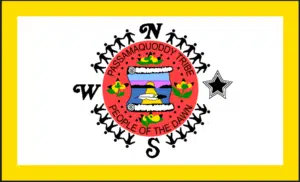
The Schoodic Peninsula in Maine comes from the Passamaquoddy Indian word ‘skut-auke’ meaning ‘place of the fire’ or ‘land that has been burned’.
Whether this was a place that was the origin of their fire story or a place that they burned at some interval to spur new growth or a spot that was prone to lightning strikes and became a burning place…unknown to us.
But Fire and light must have been there enough for those people to name the place after this animating spirit.
Many of the islands and peninsulas in that corner of the world figure prominently in the Passamaquoddy (a branch of the Wabanaki) cosmology. Grand Manan is a few miles from Schoodic and looms large in the very creation of the Passamaquoddy people themselves as they understand and tell it.
Dawn, the daughter of the sea and the sky, was chased to the edge of the sea by wolves. She hid from them and saved herself by becoming the island forevermore.
The Passamaquoddy call themselves “Children of Dawn”
To this day members of the tribe will go to Grand Manan – the men will attend their first hunt there and offer what animal they take to Dawn. She gets fed first and prayed to first and thanked first. Women prepare all winter for the first after-winter ceremony and do their oblations on the very living belly of Dawn.
In 1740 a ship full of Irish immigrants set sail for the Carolinas but weather conditions and disease forced them to crash into the shoals around Grand Manan just before winter.
All the men died.
In the spring of 1741, Passamaquoddy hunters were shocked when they paddled to the island for their hunt and heard voices. Ten women had survived all winter on food they literally pulled from the rocks – seaweed and clams, and periwinkles. and mussels. They built primitive shelters and set small fires. The Passamaquoddy, there for the first hunt and the after-winter ceremony, were astounded that they were there standing after a winter like that. But there they were, ten women in tatters and hungry but very much alive.
They knew that the only way these women survived was for Dawn to have taken care of them and the one infant among them.
It had been a century, or so since French and English and Dutch missionary/colonialists had been tromping through that land. Settlements abounded. Indians were hated. The indigenous culture had been deeply fractured in just three or four generations.
And yet this devotion to Dawn, their Mother was still present.
Instead of bringing the women to the closer French settlement and ransoming them there, the Passamaquoddy hunters decided to bring a letter to the nearest English settlement. That they would travel over 100 miles in an open boat, risking their lives on the women’s behalf, is even more remarkable. But such was their devotion to Dawn, their mother who had saved these women.
While a ship from St. George went to Grand Manan to pick up the last survivors, bringing them back. About four or five of these Irish women stayed and married local men and put down deep roots in Maine and kept lifelong close relationships with the Passamaquoddy because they were so moved by the care of these ones who, even in their own ongoing trauma of their way of life being ground into dust, had a tether to the courtesy of the old ways.
These manners might be a quality that emerges when a group has a deep allegiance to a place that they treat as alive and as a being. Relational obligations seem to become de rigueur when humans aren’t at the center of the ceremonial approach. Almost an emergent property.
The Passamaquoddy have sung this song since as long as they might remember and perhaps as they paddled to unwittingly meet those Wintered survivors. I don’t know.
Nilun pesēsmuk elintakwik
We are the Stars which Sing
Nilun pesēsmuk elintakwik
Nt’lintotēp’n k’p’sakh’nmâk’nuk.
Nilun sipsisuk skwu‛tik;
K’p’mitoyap’n pisokikw’s;
K’p’sakh’nmâk’n p’sēs’m.
We are the stars which sing
We sing with our light.
We are the birds of fire;
We fly over the heaven;
Our light is a star
K’t’lintowanen aut niweskwuk;
W’t-aut K’tci Niweskw.
Kwitcimkononowuk nohowuk k’tonkewin’wuk
Nosokwat muwiniyul.
Nit meskw tepnaskwiewis
Meskw k’tonketitikw.
K’t’lapinen pemteni‛kok.
Yut lintowâk’n pemteni‛kok.
We sing on the road of the spirits;
The road of the great spirit.
Among us are three hunters
Who follow the bear,
There never was a time
When they were not hunting.
We look upon the mountains
This is a song of the mountains.
Here at Primal Derma the telling of these old stories and these old ways that emerge from an understanding of a living place matter. Of the many prayers I have for this venture is that these little jars are a small embodiment of such an understanding. A pointing in the direction of such. Such is my practice. May it remind you as much as I need reminding and am reminded.

